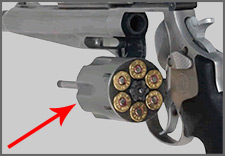Home | Glossary | Resources | Help | Contact Us | Course Map
Aviso de archivo
Esta es una página de archivo que ya no se actualiza. Puede contener información desactualizada y es posible que los enlaces ya no funcionen como se pretendía originalmente.
Firearms
Use of Adapters
Adapters in the form of a sleeve may be inserted into the barrel of a firearm permitting the use of alternative cartridge types. In this scenario, chamber marks would be the focus of examination if the sleeve were recovered.
Substitution of Parts
- Replacement of pistol components: If pistol parts such as the firing pin, extractor, ejector, chamber, or slide were replaced, cartridge cases fired in the pistol in its original condition would no longer be identifiable with the firearm.
- Revolver cylinders: In an even simpler operation than replacement of pistol parts, the replacement of a revolver cylinder would change a whole set of chamber marks.
Firearm Modifications
- Refiling of parts: If firearm parts such as the firing pin, extractor, chamber, or slide were to be refiled or otherwise abraded, cartridge cases fired in the firearm in its original condition would no longer be identifiable with the altered part.
Firearm Manufacturer-Related Factors:
- Subclass characteristics: If the influence of subclass characteristics cannot be eliminated as a possibility, identifications of cartridge cases or shotshell cases may not be possible.
- Ultrasmooth machining techniques:In many cases involving highly polished surfaces, there may be no marks of value present for comparison purposes. This is frequently noted in new firing pins and in some brands of firearms.
Additional Online Courses
- What Every First Responding Officer Should Know About DNA Evidence
- Collecting DNA Evidence at Property Crime Scenes
- DNA – A Prosecutor’s Practice Notebook
- Crime Scene and DNA Basics
- Laboratory Safety Programs
- DNA Amplification
- Population Genetics and Statistics
- Non-STR DNA Markers: SNPs, Y-STRs, LCN and mtDNA
- Firearms Examiner Training
- Forensic DNA Education for Law Enforcement Decisionmakers
- What Every Investigator and Evidence Technician Should Know About DNA Evidence
- Principles of Forensic DNA for Officers of the Court
- Law 101: Legal Guide for the Forensic Expert
- Laboratory Orientation and Testing of Body Fluids and Tissues
- DNA Extraction and Quantitation
- STR Data Analysis and Interpretation
- Communication Skills, Report Writing, and Courtroom Testimony
- Español for Law Enforcement
- Amplified DNA Product Separation for Forensic Analysts


